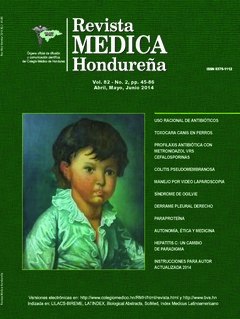Antibiotic prophylaxis with Metronidazol vrs Cephalosporins in patients undergoing hysterectomy in the Instituto Hondureño de Seguridad Social
Keywords:
Hysterectomy, Metronidazol, Cephalosporin, Prophylaxis, InfectionAbstract
Currently gynecological surgery is indicated in women of childbearing age and menopause for a variety of reasons including uterine fibroids, dysfunctional bleeding, genital prolapse, and neoplastic processes among others. After cesarean section, hysterectomy is the second most common gynecological surgery in women. OBJECTIVE: Establish a relationship between the incidence of post-surgical infections and the use of alternate schemes of prophylactic antibiotics comparing the vaginal application of a single dose of Metronidazol in patients undergoing hysterectomy with respect to a control group receiving cephalosporins as prophylactic antibiotics following standard I.H.S.S. guidelines. METHOD: A prospective observational study was made including 64 patients checked in the Gynecology Unit of the I.H.S.S. between January and June 2012, programmed for elective Hysterectomy. Patients were divided into two groups by choice. The first group was treated with a cephalosporin as prophylactic antibiotic during the January-March period; the second received a single vaginal dose of Metronidazol during the April-June period. Data was collected from the patient’s clinical file and subsequently analyzed using 2005 Epilnfo software version 3.3.2. RESULTS: Frequency of post-surgical infectious complications was 25% (16/64). Abdominal hysterectomy was the most frequent surgery, 90.6% (58/64). Infectious complications were present in 41% (7/17) of patients treated with Metronidazol and 19% (9/47) of those treated with Cephalosporins. A history of hypertension as a personal pathological condition had a significant statistical importance, OR: 1.6667. There were no important statistical differences between both groups in relation to patients’ demographic or surgical variables. CONCLUSION: Vaginal Metronidazol as a prophylactic antibiotic for abdominal hysterectomies does not reduce the postsurgical infectious morbidity with respect to the use of Cephalosporins.
Downloads
568




